Economics for Business (MOD 003349): UK Rental Housing Report
VerifiedAdded on 2022/08/18
|17
|3571
|9
Report
AI Summary
This report provides an in-depth analysis of the UK private rental housing market. It examines the factors influencing rental costs, focusing on both demand and supply dynamics. The demand-side analysis considers factors such as the impact of Brexit and the influx of migrant laborers, illustrating these effects with graphical representations of demand shifts. The supply-side analysis explores the impact of house building and government legislation on the market. Furthermore, the report delves into how government and economic policies, including landlord and tenant rights, taxation, and interest rates, can influence and control the demand for private rental housing. The analysis considers the effects of taxation, interest rate changes, and government regulations on the housing market, offering a comprehensive overview of the economic forces at play.
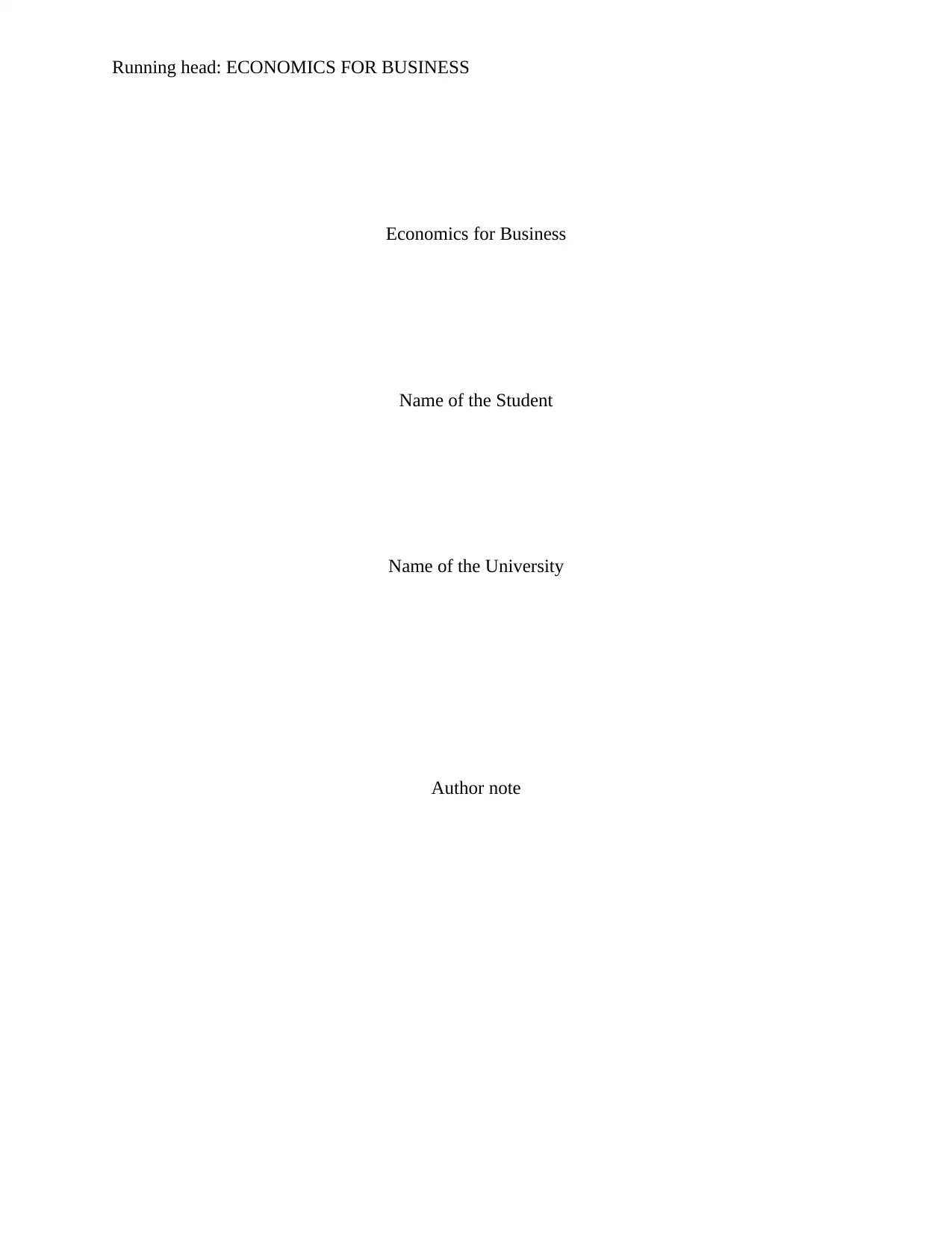
Running head: ECONOMICS FOR BUSINESS
Economics for Business
Name of the Student
Name of the University
Author note
Economics for Business
Name of the Student
Name of the University
Author note
Paraphrase This Document
Need a fresh take? Get an instant paraphrase of this document with our AI Paraphraser
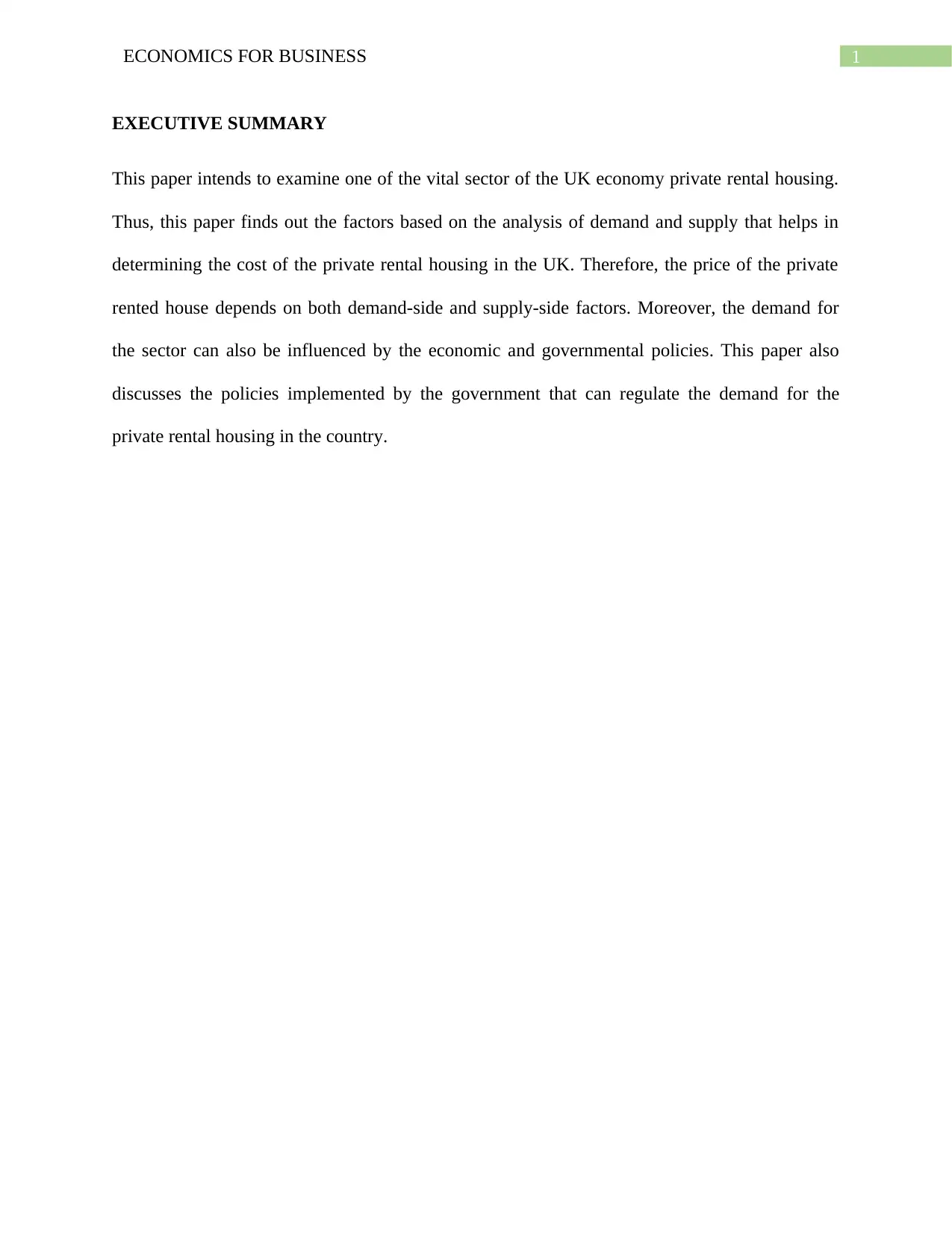
1ECONOMICS FOR BUSINESS
EXECUTIVE SUMMARY
This paper intends to examine one of the vital sector of the UK economy private rental housing.
Thus, this paper finds out the factors based on the analysis of demand and supply that helps in
determining the cost of the private rental housing in the UK. Therefore, the price of the private
rented house depends on both demand-side and supply-side factors. Moreover, the demand for
the sector can also be influenced by the economic and governmental policies. This paper also
discusses the policies implemented by the government that can regulate the demand for the
private rental housing in the country.
EXECUTIVE SUMMARY
This paper intends to examine one of the vital sector of the UK economy private rental housing.
Thus, this paper finds out the factors based on the analysis of demand and supply that helps in
determining the cost of the private rental housing in the UK. Therefore, the price of the private
rented house depends on both demand-side and supply-side factors. Moreover, the demand for
the sector can also be influenced by the economic and governmental policies. This paper also
discusses the policies implemented by the government that can regulate the demand for the
private rental housing in the country.
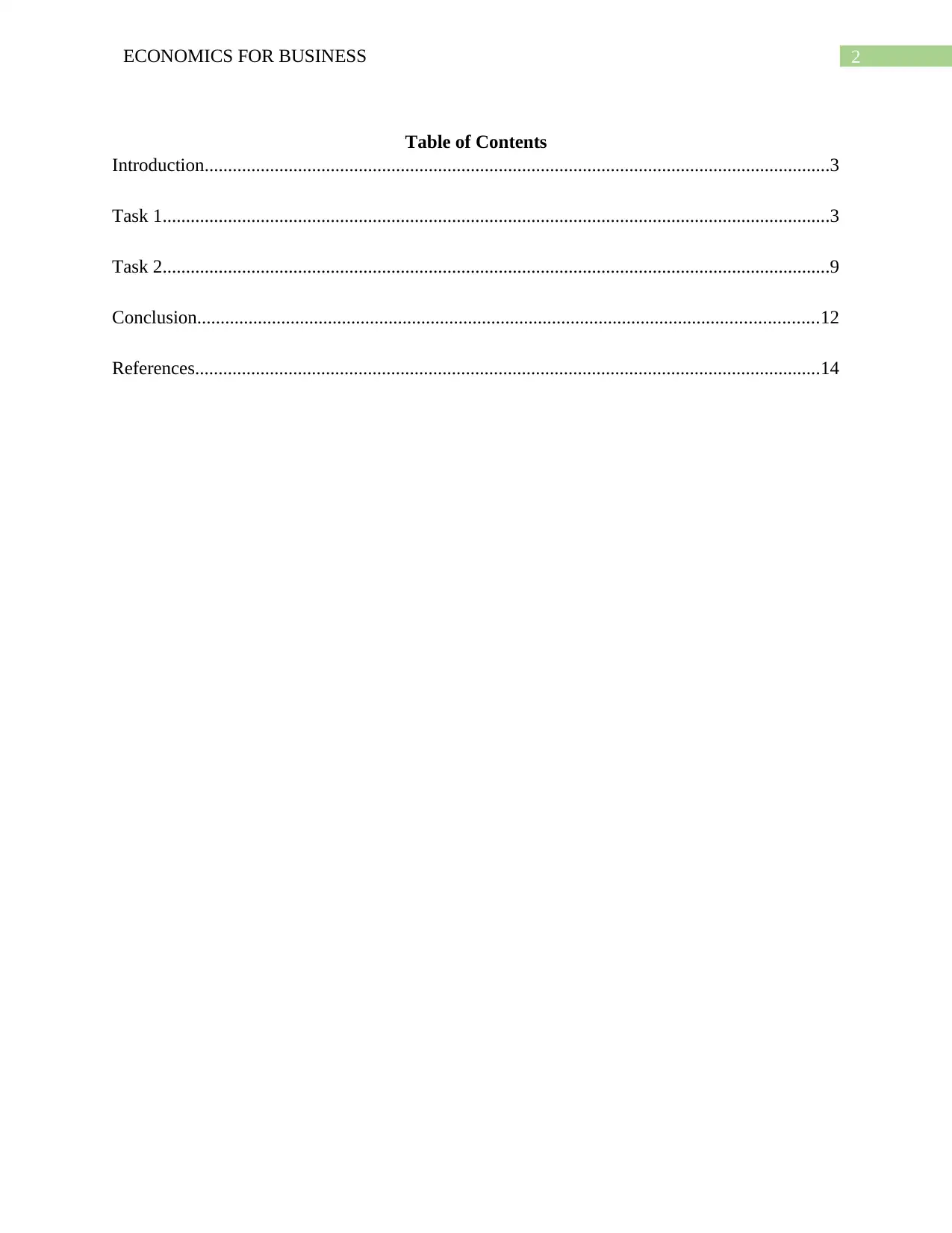
2ECONOMICS FOR BUSINESS
Table of Contents
Introduction......................................................................................................................................3
Task 1...............................................................................................................................................3
Task 2...............................................................................................................................................9
Conclusion.....................................................................................................................................12
References......................................................................................................................................14
Table of Contents
Introduction......................................................................................................................................3
Task 1...............................................................................................................................................3
Task 2...............................................................................................................................................9
Conclusion.....................................................................................................................................12
References......................................................................................................................................14
⊘ This is a preview!⊘
Do you want full access?
Subscribe today to unlock all pages.

Trusted by 1+ million students worldwide
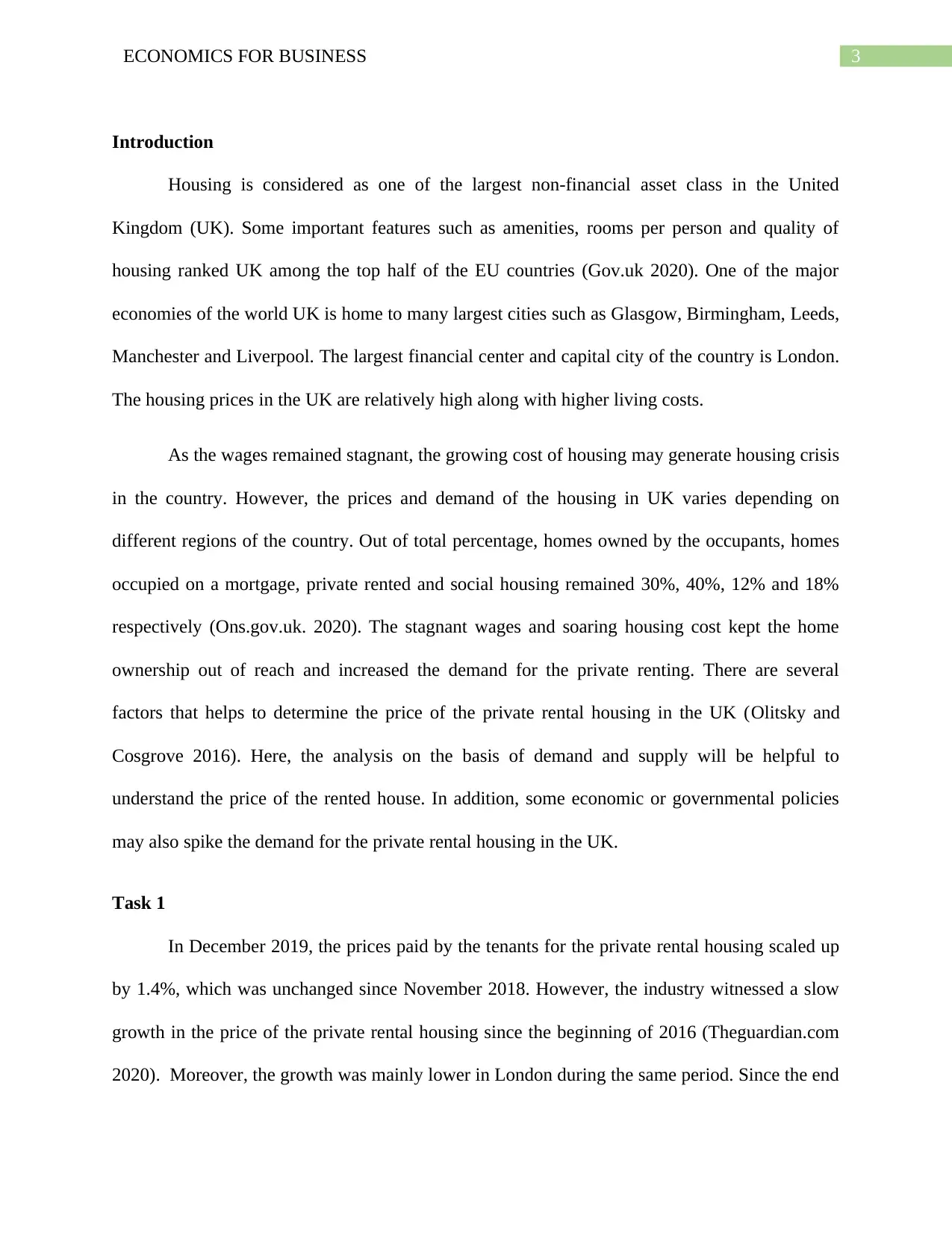
3ECONOMICS FOR BUSINESS
Introduction
Housing is considered as one of the largest non-financial asset class in the United
Kingdom (UK). Some important features such as amenities, rooms per person and quality of
housing ranked UK among the top half of the EU countries (Gov.uk 2020). One of the major
economies of the world UK is home to many largest cities such as Glasgow, Birmingham, Leeds,
Manchester and Liverpool. The largest financial center and capital city of the country is London.
The housing prices in the UK are relatively high along with higher living costs.
As the wages remained stagnant, the growing cost of housing may generate housing crisis
in the country. However, the prices and demand of the housing in UK varies depending on
different regions of the country. Out of total percentage, homes owned by the occupants, homes
occupied on a mortgage, private rented and social housing remained 30%, 40%, 12% and 18%
respectively (Ons.gov.uk. 2020). The stagnant wages and soaring housing cost kept the home
ownership out of reach and increased the demand for the private renting. There are several
factors that helps to determine the price of the private rental housing in the UK (Olitsky and
Cosgrove 2016). Here, the analysis on the basis of demand and supply will be helpful to
understand the price of the rented house. In addition, some economic or governmental policies
may also spike the demand for the private rental housing in the UK.
Task 1
In December 2019, the prices paid by the tenants for the private rental housing scaled up
by 1.4%, which was unchanged since November 2018. However, the industry witnessed a slow
growth in the price of the private rental housing since the beginning of 2016 (Theguardian.com
2020). Moreover, the growth was mainly lower in London during the same period. Since the end
Introduction
Housing is considered as one of the largest non-financial asset class in the United
Kingdom (UK). Some important features such as amenities, rooms per person and quality of
housing ranked UK among the top half of the EU countries (Gov.uk 2020). One of the major
economies of the world UK is home to many largest cities such as Glasgow, Birmingham, Leeds,
Manchester and Liverpool. The largest financial center and capital city of the country is London.
The housing prices in the UK are relatively high along with higher living costs.
As the wages remained stagnant, the growing cost of housing may generate housing crisis
in the country. However, the prices and demand of the housing in UK varies depending on
different regions of the country. Out of total percentage, homes owned by the occupants, homes
occupied on a mortgage, private rented and social housing remained 30%, 40%, 12% and 18%
respectively (Ons.gov.uk. 2020). The stagnant wages and soaring housing cost kept the home
ownership out of reach and increased the demand for the private renting. There are several
factors that helps to determine the price of the private rental housing in the UK (Olitsky and
Cosgrove 2016). Here, the analysis on the basis of demand and supply will be helpful to
understand the price of the rented house. In addition, some economic or governmental policies
may also spike the demand for the private rental housing in the UK.
Task 1
In December 2019, the prices paid by the tenants for the private rental housing scaled up
by 1.4%, which was unchanged since November 2018. However, the industry witnessed a slow
growth in the price of the private rental housing since the beginning of 2016 (Theguardian.com
2020). Moreover, the growth was mainly lower in London during the same period. Since the end
Paraphrase This Document
Need a fresh take? Get an instant paraphrase of this document with our AI Paraphraser
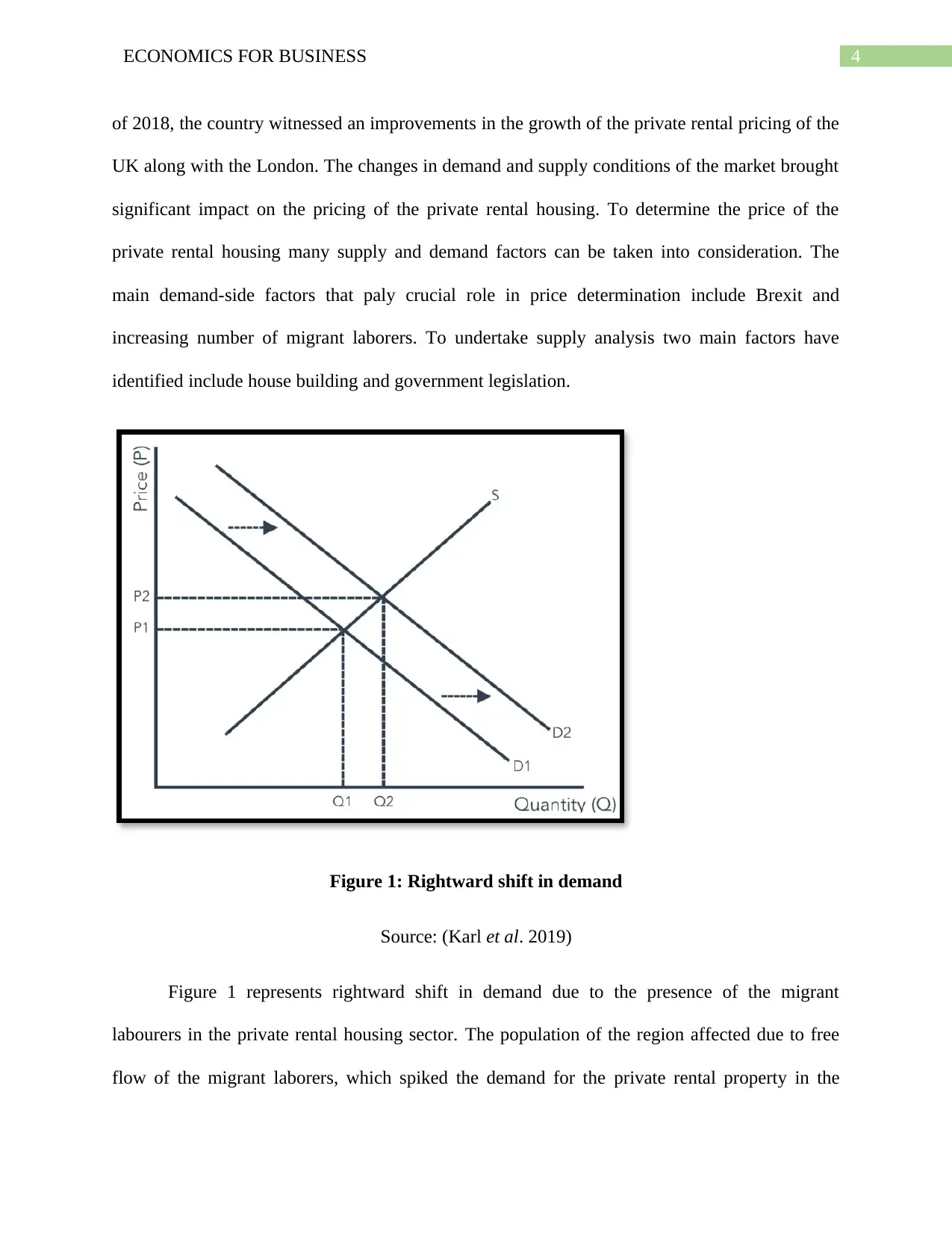
4ECONOMICS FOR BUSINESS
of 2018, the country witnessed an improvements in the growth of the private rental pricing of the
UK along with the London. The changes in demand and supply conditions of the market brought
significant impact on the pricing of the private rental housing. To determine the price of the
private rental housing many supply and demand factors can be taken into consideration. The
main demand-side factors that paly crucial role in price determination include Brexit and
increasing number of migrant laborers. To undertake supply analysis two main factors have
identified include house building and government legislation.
Figure 1: Rightward shift in demand
Source: (Karl et al. 2019)
Figure 1 represents rightward shift in demand due to the presence of the migrant
labourers in the private rental housing sector. The population of the region affected due to free
flow of the migrant laborers, which spiked the demand for the private rental property in the
of 2018, the country witnessed an improvements in the growth of the private rental pricing of the
UK along with the London. The changes in demand and supply conditions of the market brought
significant impact on the pricing of the private rental housing. To determine the price of the
private rental housing many supply and demand factors can be taken into consideration. The
main demand-side factors that paly crucial role in price determination include Brexit and
increasing number of migrant laborers. To undertake supply analysis two main factors have
identified include house building and government legislation.
Figure 1: Rightward shift in demand
Source: (Karl et al. 2019)
Figure 1 represents rightward shift in demand due to the presence of the migrant
labourers in the private rental housing sector. The population of the region affected due to free
flow of the migrant laborers, which spiked the demand for the private rental property in the
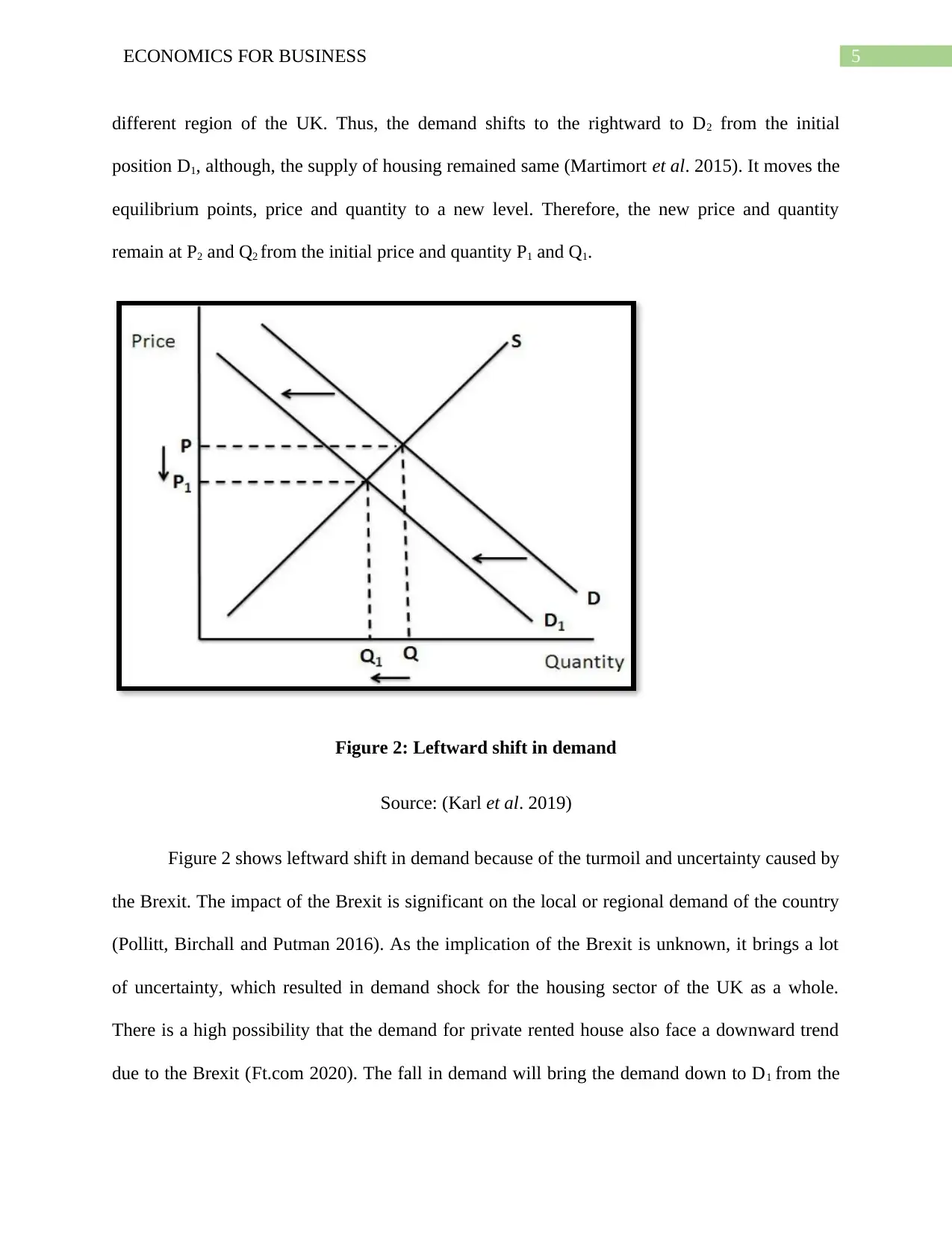
5ECONOMICS FOR BUSINESS
different region of the UK. Thus, the demand shifts to the rightward to D2 from the initial
position D1, although, the supply of housing remained same (Martimort et al. 2015). It moves the
equilibrium points, price and quantity to a new level. Therefore, the new price and quantity
remain at P2 and Q2 from the initial price and quantity P1 and Q1.
Figure 2: Leftward shift in demand
Source: (Karl et al. 2019)
Figure 2 shows leftward shift in demand because of the turmoil and uncertainty caused by
the Brexit. The impact of the Brexit is significant on the local or regional demand of the country
(Pollitt, Birchall and Putman 2016). As the implication of the Brexit is unknown, it brings a lot
of uncertainty, which resulted in demand shock for the housing sector of the UK as a whole.
There is a high possibility that the demand for private rented house also face a downward trend
due to the Brexit (Ft.com 2020). The fall in demand will bring the demand down to D1 from the
different region of the UK. Thus, the demand shifts to the rightward to D2 from the initial
position D1, although, the supply of housing remained same (Martimort et al. 2015). It moves the
equilibrium points, price and quantity to a new level. Therefore, the new price and quantity
remain at P2 and Q2 from the initial price and quantity P1 and Q1.
Figure 2: Leftward shift in demand
Source: (Karl et al. 2019)
Figure 2 shows leftward shift in demand because of the turmoil and uncertainty caused by
the Brexit. The impact of the Brexit is significant on the local or regional demand of the country
(Pollitt, Birchall and Putman 2016). As the implication of the Brexit is unknown, it brings a lot
of uncertainty, which resulted in demand shock for the housing sector of the UK as a whole.
There is a high possibility that the demand for private rented house also face a downward trend
due to the Brexit (Ft.com 2020). The fall in demand will bring the demand down to D1 from the
⊘ This is a preview!⊘
Do you want full access?
Subscribe today to unlock all pages.

Trusted by 1+ million students worldwide
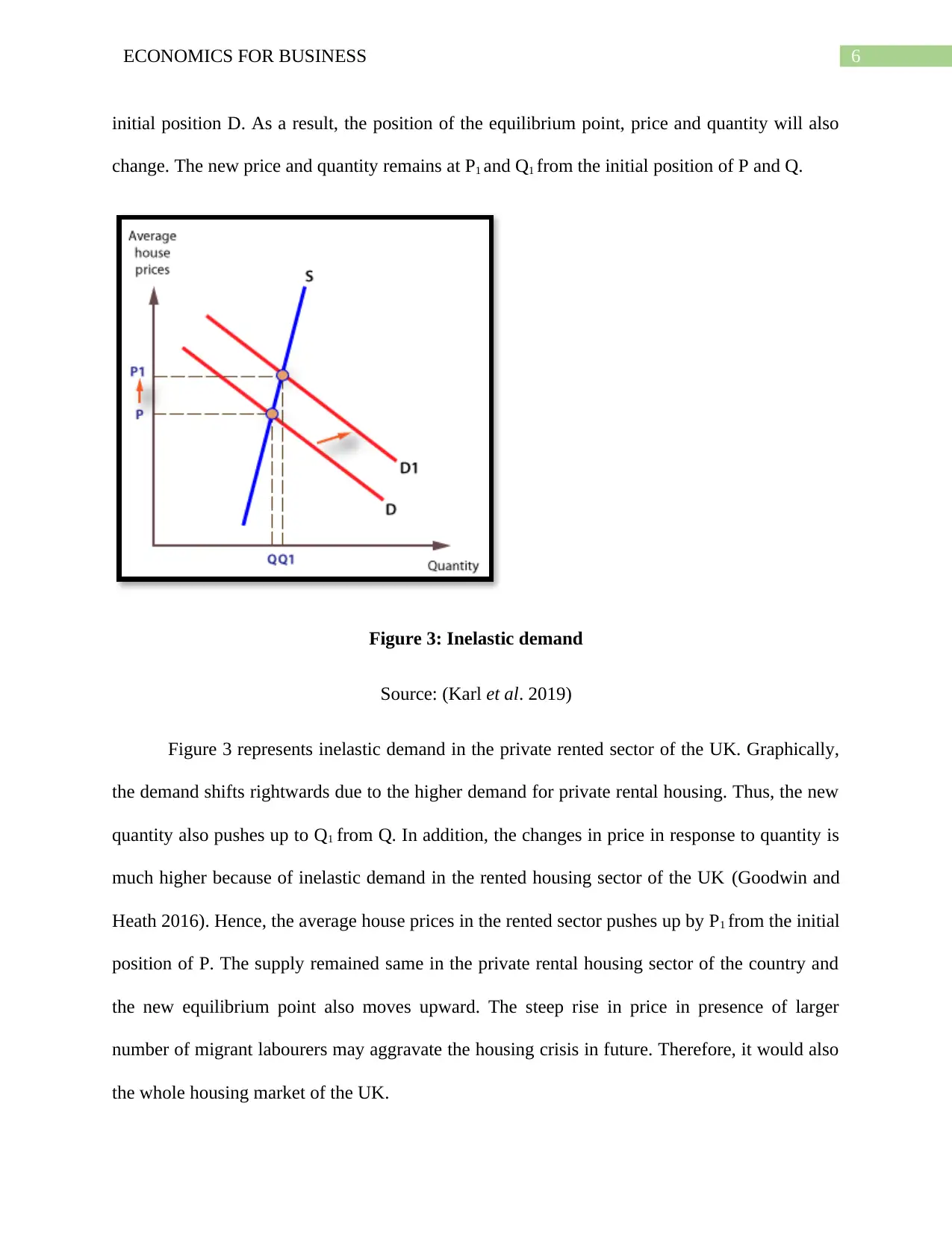
6ECONOMICS FOR BUSINESS
initial position D. As a result, the position of the equilibrium point, price and quantity will also
change. The new price and quantity remains at P1 and Q1 from the initial position of P and Q.
Figure 3: Inelastic demand
Source: (Karl et al. 2019)
Figure 3 represents inelastic demand in the private rented sector of the UK. Graphically,
the demand shifts rightwards due to the higher demand for private rental housing. Thus, the new
quantity also pushes up to Q1 from Q. In addition, the changes in price in response to quantity is
much higher because of inelastic demand in the rented housing sector of the UK (Goodwin and
Heath 2016). Hence, the average house prices in the rented sector pushes up by P1 from the initial
position of P. The supply remained same in the private rental housing sector of the country and
the new equilibrium point also moves upward. The steep rise in price in presence of larger
number of migrant labourers may aggravate the housing crisis in future. Therefore, it would also
the whole housing market of the UK.
initial position D. As a result, the position of the equilibrium point, price and quantity will also
change. The new price and quantity remains at P1 and Q1 from the initial position of P and Q.
Figure 3: Inelastic demand
Source: (Karl et al. 2019)
Figure 3 represents inelastic demand in the private rented sector of the UK. Graphically,
the demand shifts rightwards due to the higher demand for private rental housing. Thus, the new
quantity also pushes up to Q1 from Q. In addition, the changes in price in response to quantity is
much higher because of inelastic demand in the rented housing sector of the UK (Goodwin and
Heath 2016). Hence, the average house prices in the rented sector pushes up by P1 from the initial
position of P. The supply remained same in the private rental housing sector of the country and
the new equilibrium point also moves upward. The steep rise in price in presence of larger
number of migrant labourers may aggravate the housing crisis in future. Therefore, it would also
the whole housing market of the UK.
Paraphrase This Document
Need a fresh take? Get an instant paraphrase of this document with our AI Paraphraser
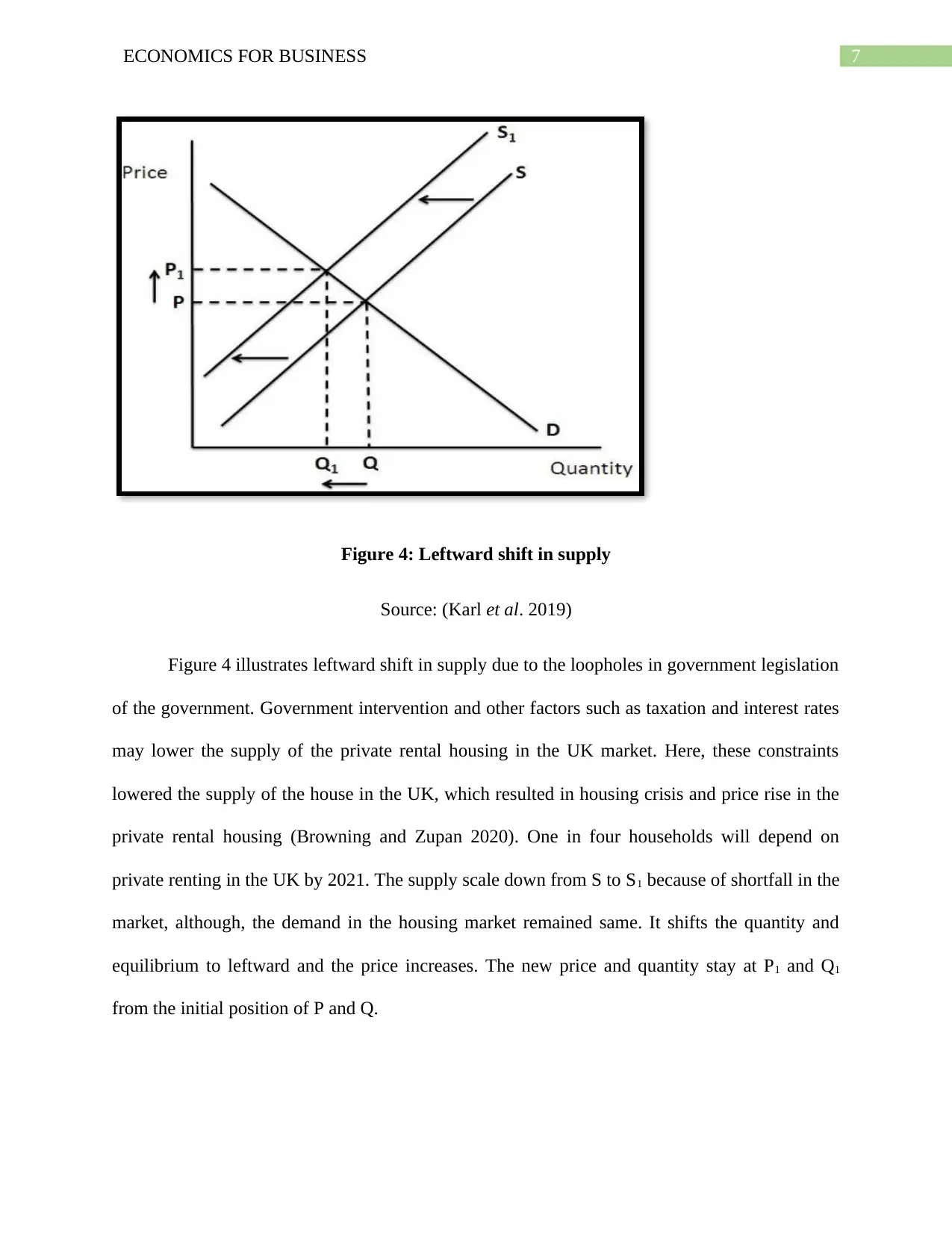
7ECONOMICS FOR BUSINESS
Figure 4: Leftward shift in supply
Source: (Karl et al. 2019)
Figure 4 illustrates leftward shift in supply due to the loopholes in government legislation
of the government. Government intervention and other factors such as taxation and interest rates
may lower the supply of the private rental housing in the UK market. Here, these constraints
lowered the supply of the house in the UK, which resulted in housing crisis and price rise in the
private rental housing (Browning and Zupan 2020). One in four households will depend on
private renting in the UK by 2021. The supply scale down from S to S1 because of shortfall in the
market, although, the demand in the housing market remained same. It shifts the quantity and
equilibrium to leftward and the price increases. The new price and quantity stay at P1 and Q1
from the initial position of P and Q.
Figure 4: Leftward shift in supply
Source: (Karl et al. 2019)
Figure 4 illustrates leftward shift in supply due to the loopholes in government legislation
of the government. Government intervention and other factors such as taxation and interest rates
may lower the supply of the private rental housing in the UK market. Here, these constraints
lowered the supply of the house in the UK, which resulted in housing crisis and price rise in the
private rental housing (Browning and Zupan 2020). One in four households will depend on
private renting in the UK by 2021. The supply scale down from S to S1 because of shortfall in the
market, although, the demand in the housing market remained same. It shifts the quantity and
equilibrium to leftward and the price increases. The new price and quantity stay at P1 and Q1
from the initial position of P and Q.
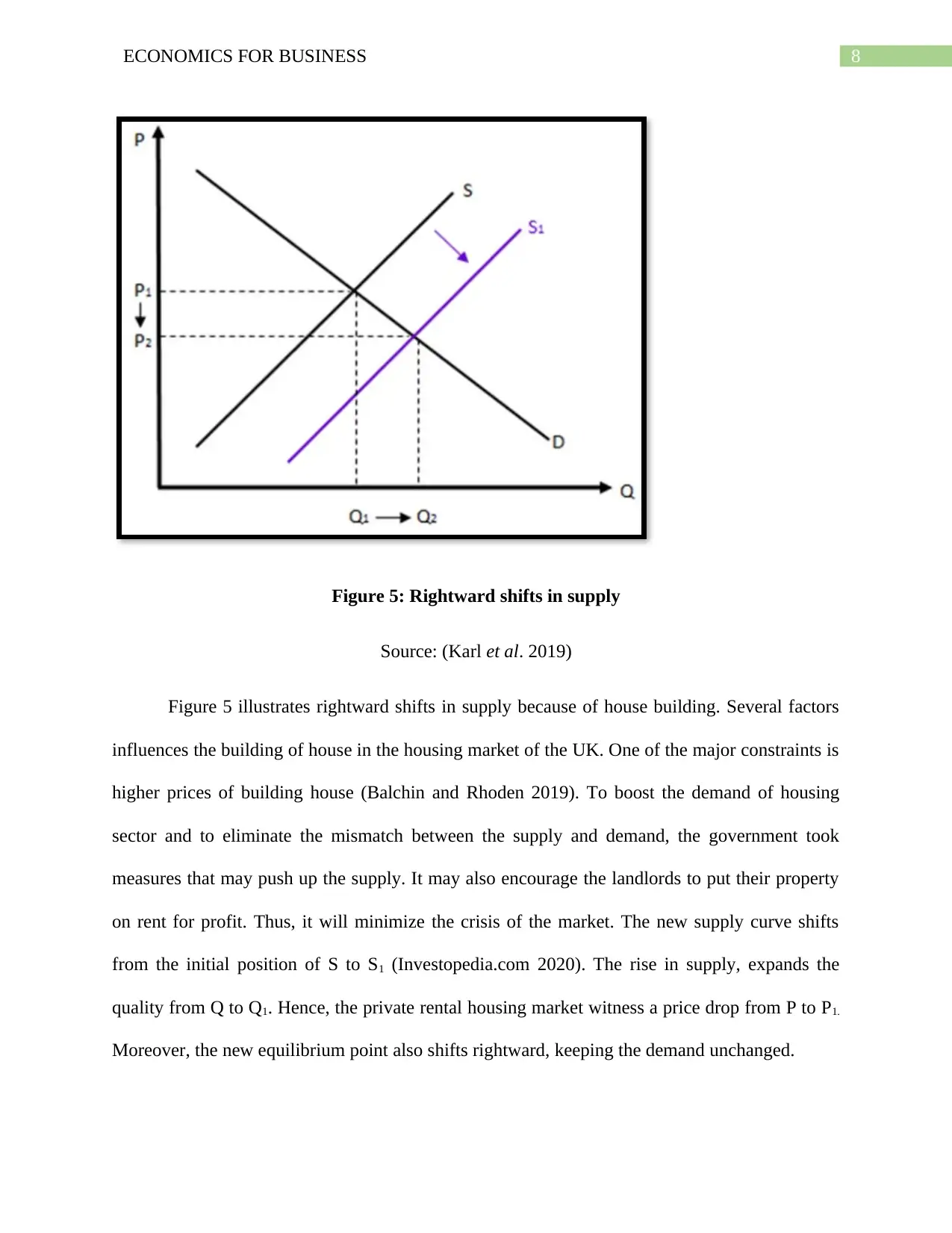
8ECONOMICS FOR BUSINESS
Figure 5: Rightward shifts in supply
Source: (Karl et al. 2019)
Figure 5 illustrates rightward shifts in supply because of house building. Several factors
influences the building of house in the housing market of the UK. One of the major constraints is
higher prices of building house (Balchin and Rhoden 2019). To boost the demand of housing
sector and to eliminate the mismatch between the supply and demand, the government took
measures that may push up the supply. It may also encourage the landlords to put their property
on rent for profit. Thus, it will minimize the crisis of the market. The new supply curve shifts
from the initial position of S to S1 (Investopedia.com 2020). The rise in supply, expands the
quality from Q to Q1. Hence, the private rental housing market witness a price drop from P to P1.
Moreover, the new equilibrium point also shifts rightward, keeping the demand unchanged.
Figure 5: Rightward shifts in supply
Source: (Karl et al. 2019)
Figure 5 illustrates rightward shifts in supply because of house building. Several factors
influences the building of house in the housing market of the UK. One of the major constraints is
higher prices of building house (Balchin and Rhoden 2019). To boost the demand of housing
sector and to eliminate the mismatch between the supply and demand, the government took
measures that may push up the supply. It may also encourage the landlords to put their property
on rent for profit. Thus, it will minimize the crisis of the market. The new supply curve shifts
from the initial position of S to S1 (Investopedia.com 2020). The rise in supply, expands the
quality from Q to Q1. Hence, the private rental housing market witness a price drop from P to P1.
Moreover, the new equilibrium point also shifts rightward, keeping the demand unchanged.
⊘ This is a preview!⊘
Do you want full access?
Subscribe today to unlock all pages.

Trusted by 1+ million students worldwide
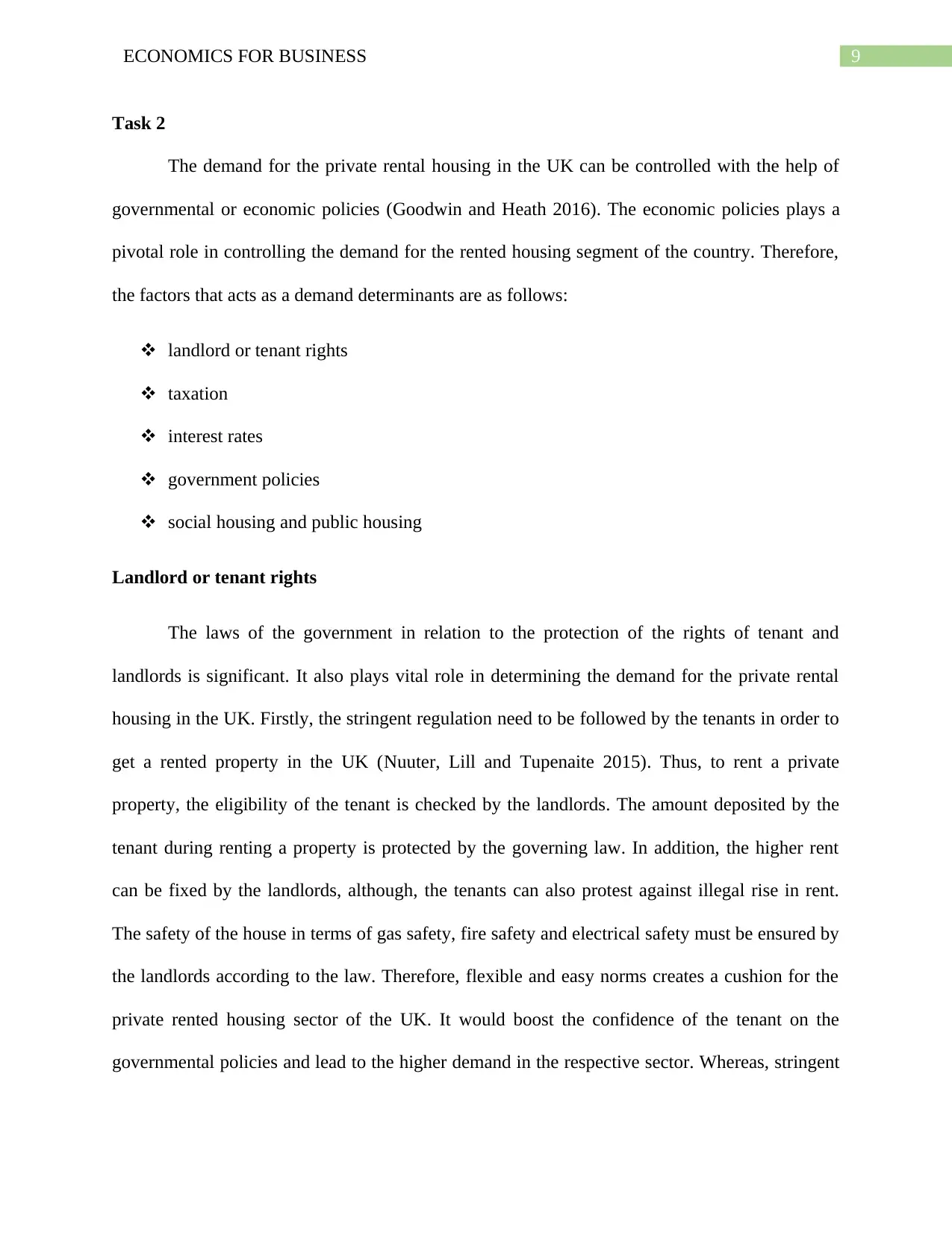
9ECONOMICS FOR BUSINESS
Task 2
The demand for the private rental housing in the UK can be controlled with the help of
governmental or economic policies (Goodwin and Heath 2016). The economic policies plays a
pivotal role in controlling the demand for the rented housing segment of the country. Therefore,
the factors that acts as a demand determinants are as follows:
landlord or tenant rights
taxation
interest rates
government policies
social housing and public housing
Landlord or tenant rights
The laws of the government in relation to the protection of the rights of tenant and
landlords is significant. It also plays vital role in determining the demand for the private rental
housing in the UK. Firstly, the stringent regulation need to be followed by the tenants in order to
get a rented property in the UK (Nuuter, Lill and Tupenaite 2015). Thus, to rent a private
property, the eligibility of the tenant is checked by the landlords. The amount deposited by the
tenant during renting a property is protected by the governing law. In addition, the higher rent
can be fixed by the landlords, although, the tenants can also protest against illegal rise in rent.
The safety of the house in terms of gas safety, fire safety and electrical safety must be ensured by
the landlords according to the law. Therefore, flexible and easy norms creates a cushion for the
private rented housing sector of the UK. It would boost the confidence of the tenant on the
governmental policies and lead to the higher demand in the respective sector. Whereas, stringent
Task 2
The demand for the private rental housing in the UK can be controlled with the help of
governmental or economic policies (Goodwin and Heath 2016). The economic policies plays a
pivotal role in controlling the demand for the rented housing segment of the country. Therefore,
the factors that acts as a demand determinants are as follows:
landlord or tenant rights
taxation
interest rates
government policies
social housing and public housing
Landlord or tenant rights
The laws of the government in relation to the protection of the rights of tenant and
landlords is significant. It also plays vital role in determining the demand for the private rental
housing in the UK. Firstly, the stringent regulation need to be followed by the tenants in order to
get a rented property in the UK (Nuuter, Lill and Tupenaite 2015). Thus, to rent a private
property, the eligibility of the tenant is checked by the landlords. The amount deposited by the
tenant during renting a property is protected by the governing law. In addition, the higher rent
can be fixed by the landlords, although, the tenants can also protest against illegal rise in rent.
The safety of the house in terms of gas safety, fire safety and electrical safety must be ensured by
the landlords according to the law. Therefore, flexible and easy norms creates a cushion for the
private rented housing sector of the UK. It would boost the confidence of the tenant on the
governmental policies and lead to the higher demand in the respective sector. Whereas, stringent
Paraphrase This Document
Need a fresh take? Get an instant paraphrase of this document with our AI Paraphraser
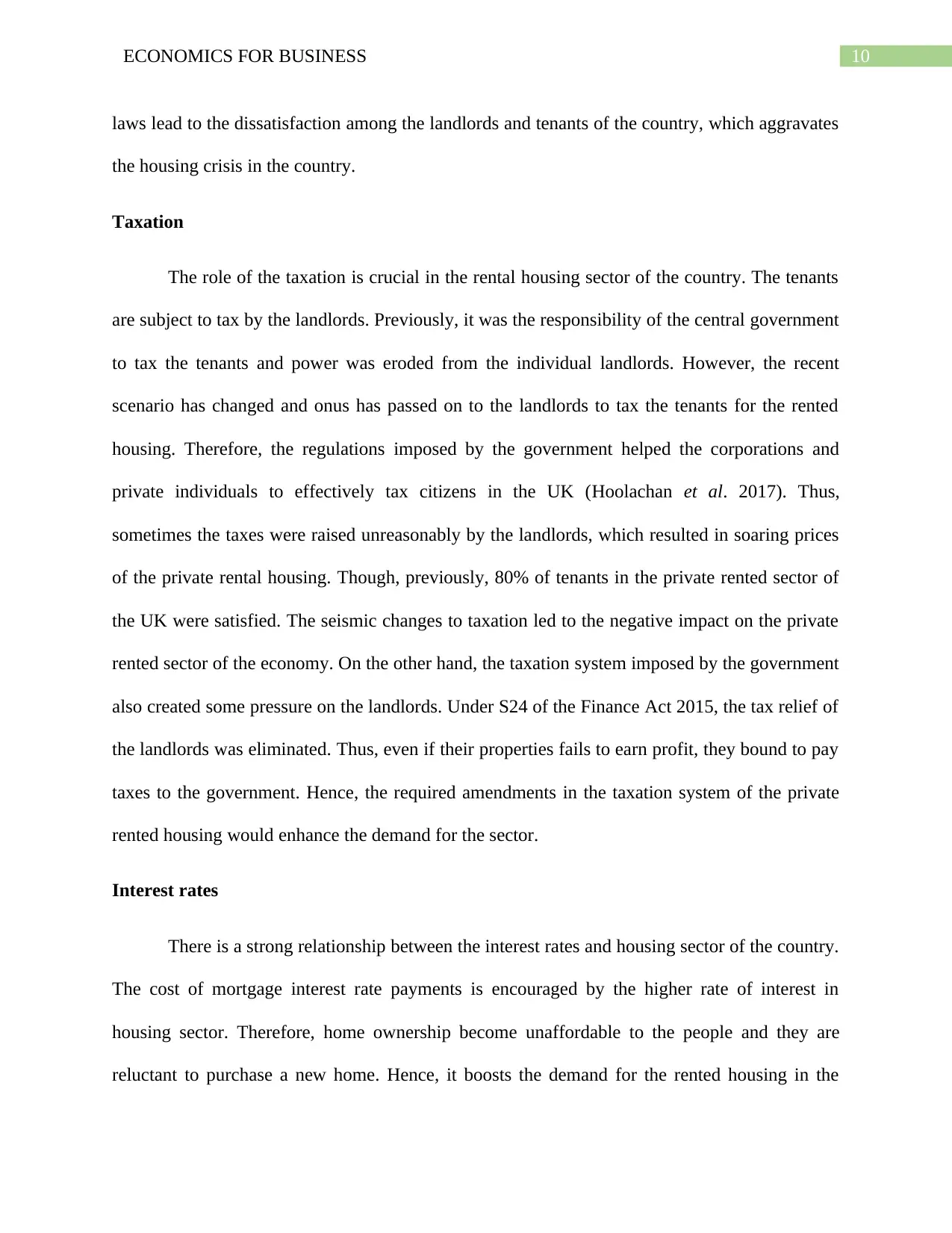
10ECONOMICS FOR BUSINESS
laws lead to the dissatisfaction among the landlords and tenants of the country, which aggravates
the housing crisis in the country.
Taxation
The role of the taxation is crucial in the rental housing sector of the country. The tenants
are subject to tax by the landlords. Previously, it was the responsibility of the central government
to tax the tenants and power was eroded from the individual landlords. However, the recent
scenario has changed and onus has passed on to the landlords to tax the tenants for the rented
housing. Therefore, the regulations imposed by the government helped the corporations and
private individuals to effectively tax citizens in the UK (Hoolachan et al. 2017). Thus,
sometimes the taxes were raised unreasonably by the landlords, which resulted in soaring prices
of the private rental housing. Though, previously, 80% of tenants in the private rented sector of
the UK were satisfied. The seismic changes to taxation led to the negative impact on the private
rented sector of the economy. On the other hand, the taxation system imposed by the government
also created some pressure on the landlords. Under S24 of the Finance Act 2015, the tax relief of
the landlords was eliminated. Thus, even if their properties fails to earn profit, they bound to pay
taxes to the government. Hence, the required amendments in the taxation system of the private
rented housing would enhance the demand for the sector.
Interest rates
There is a strong relationship between the interest rates and housing sector of the country.
The cost of mortgage interest rate payments is encouraged by the higher rate of interest in
housing sector. Therefore, home ownership become unaffordable to the people and they are
reluctant to purchase a new home. Hence, it boosts the demand for the rented housing in the
laws lead to the dissatisfaction among the landlords and tenants of the country, which aggravates
the housing crisis in the country.
Taxation
The role of the taxation is crucial in the rental housing sector of the country. The tenants
are subject to tax by the landlords. Previously, it was the responsibility of the central government
to tax the tenants and power was eroded from the individual landlords. However, the recent
scenario has changed and onus has passed on to the landlords to tax the tenants for the rented
housing. Therefore, the regulations imposed by the government helped the corporations and
private individuals to effectively tax citizens in the UK (Hoolachan et al. 2017). Thus,
sometimes the taxes were raised unreasonably by the landlords, which resulted in soaring prices
of the private rental housing. Though, previously, 80% of tenants in the private rented sector of
the UK were satisfied. The seismic changes to taxation led to the negative impact on the private
rented sector of the economy. On the other hand, the taxation system imposed by the government
also created some pressure on the landlords. Under S24 of the Finance Act 2015, the tax relief of
the landlords was eliminated. Thus, even if their properties fails to earn profit, they bound to pay
taxes to the government. Hence, the required amendments in the taxation system of the private
rented housing would enhance the demand for the sector.
Interest rates
There is a strong relationship between the interest rates and housing sector of the country.
The cost of mortgage interest rate payments is encouraged by the higher rate of interest in
housing sector. Therefore, home ownership become unaffordable to the people and they are
reluctant to purchase a new home. Hence, it boosts the demand for the rented housing in the
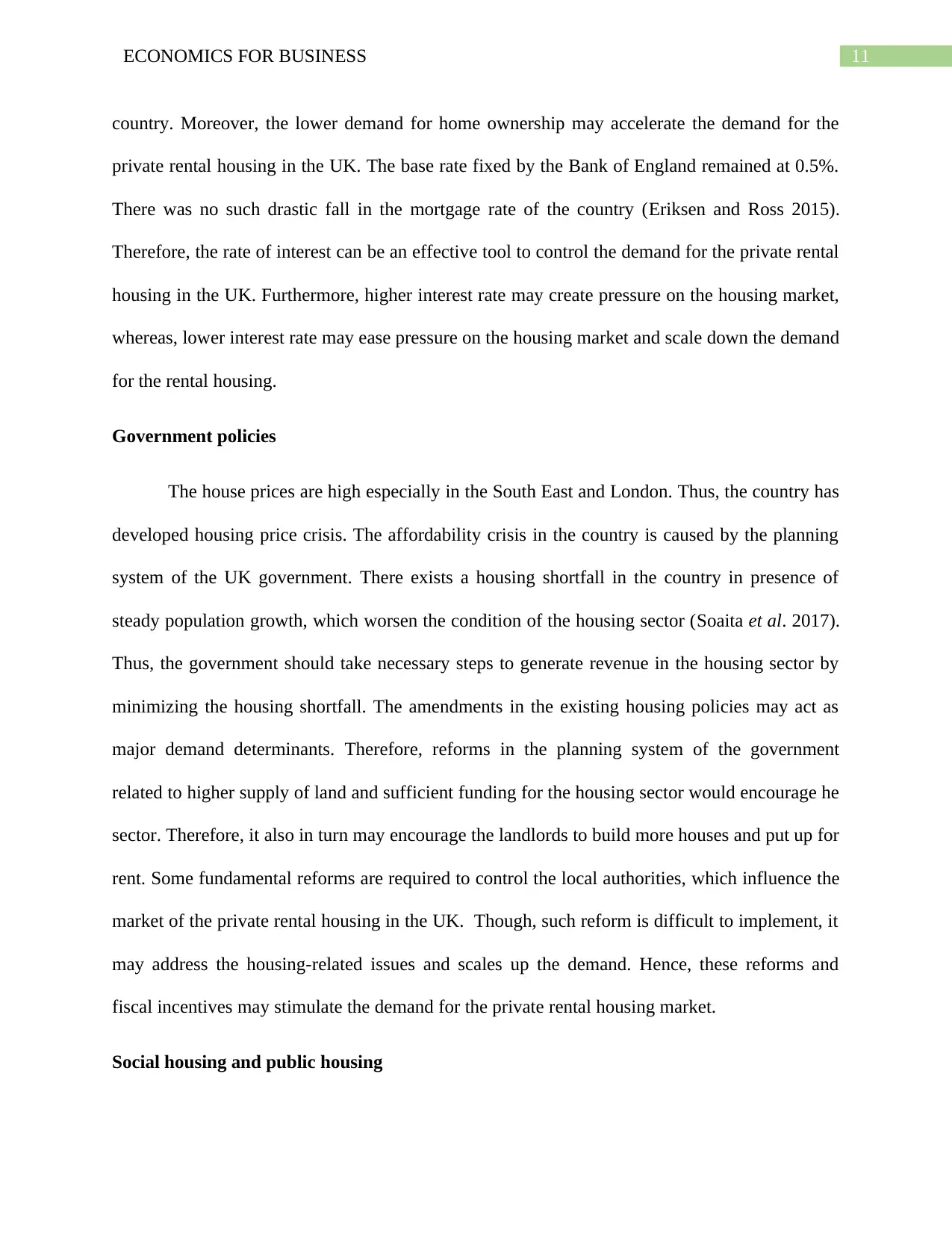
11ECONOMICS FOR BUSINESS
country. Moreover, the lower demand for home ownership may accelerate the demand for the
private rental housing in the UK. The base rate fixed by the Bank of England remained at 0.5%.
There was no such drastic fall in the mortgage rate of the country (Eriksen and Ross 2015).
Therefore, the rate of interest can be an effective tool to control the demand for the private rental
housing in the UK. Furthermore, higher interest rate may create pressure on the housing market,
whereas, lower interest rate may ease pressure on the housing market and scale down the demand
for the rental housing.
Government policies
The house prices are high especially in the South East and London. Thus, the country has
developed housing price crisis. The affordability crisis in the country is caused by the planning
system of the UK government. There exists a housing shortfall in the country in presence of
steady population growth, which worsen the condition of the housing sector (Soaita et al. 2017).
Thus, the government should take necessary steps to generate revenue in the housing sector by
minimizing the housing shortfall. The amendments in the existing housing policies may act as
major demand determinants. Therefore, reforms in the planning system of the government
related to higher supply of land and sufficient funding for the housing sector would encourage he
sector. Therefore, it also in turn may encourage the landlords to build more houses and put up for
rent. Some fundamental reforms are required to control the local authorities, which influence the
market of the private rental housing in the UK. Though, such reform is difficult to implement, it
may address the housing-related issues and scales up the demand. Hence, these reforms and
fiscal incentives may stimulate the demand for the private rental housing market.
Social housing and public housing
country. Moreover, the lower demand for home ownership may accelerate the demand for the
private rental housing in the UK. The base rate fixed by the Bank of England remained at 0.5%.
There was no such drastic fall in the mortgage rate of the country (Eriksen and Ross 2015).
Therefore, the rate of interest can be an effective tool to control the demand for the private rental
housing in the UK. Furthermore, higher interest rate may create pressure on the housing market,
whereas, lower interest rate may ease pressure on the housing market and scale down the demand
for the rental housing.
Government policies
The house prices are high especially in the South East and London. Thus, the country has
developed housing price crisis. The affordability crisis in the country is caused by the planning
system of the UK government. There exists a housing shortfall in the country in presence of
steady population growth, which worsen the condition of the housing sector (Soaita et al. 2017).
Thus, the government should take necessary steps to generate revenue in the housing sector by
minimizing the housing shortfall. The amendments in the existing housing policies may act as
major demand determinants. Therefore, reforms in the planning system of the government
related to higher supply of land and sufficient funding for the housing sector would encourage he
sector. Therefore, it also in turn may encourage the landlords to build more houses and put up for
rent. Some fundamental reforms are required to control the local authorities, which influence the
market of the private rental housing in the UK. Though, such reform is difficult to implement, it
may address the housing-related issues and scales up the demand. Hence, these reforms and
fiscal incentives may stimulate the demand for the private rental housing market.
Social housing and public housing
⊘ This is a preview!⊘
Do you want full access?
Subscribe today to unlock all pages.

Trusted by 1+ million students worldwide
1 out of 17
Related Documents
Your All-in-One AI-Powered Toolkit for Academic Success.
+13062052269
info@desklib.com
Available 24*7 on WhatsApp / Email
![[object Object]](/_next/static/media/star-bottom.7253800d.svg)
Unlock your academic potential
Copyright © 2020–2026 A2Z Services. All Rights Reserved. Developed and managed by ZUCOL.





